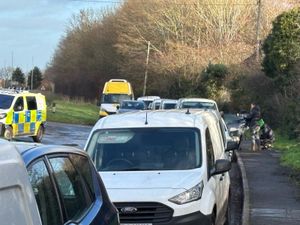Shropshire murder trial soldier says he had no memory of night
A soldier accused of killing a corporal at their Shropshire barracks has told a jury he would know if he had killed his colleague but has no memory of the night.
Lance Corporal Richard Farrell, 23, who is accused of murdering 32-year-old Corporal Geoffrey McNeill at the Clive Barracks, Tern Hill, near Market Drayton, on March 8, was giving evidence at Birmingham Crown Court yesterday.
Cross examining Farrell, prosecutor Christopher Hotten QC, said: "Your position is that you don't know whether you murdered Geoffrey McNeill or not?"
"That's not true," replied Farrell. "I would know."
Mr Hotten asked how Farrell would know if he did not remember the evening.
"You are trying to have it both ways," he said.
Farrell replied: "No disrespect but I would have a feeling.
"You don't take a person's life everyday. I would know if I had."
When asked if he had killed a man Farrell said: "I did not kill a man."
The court has heard that Corporal McNeill had punched Farrell in the Sandbrook Vaults on Shropshire Street, Market Drayton.
Mr Hotten said that this incident in the pub would have humiliated CPL Farrell in public.
Farrell denied this and said: "You are talking about my presence of mind then, so I don't know."
Mr Hotten said when Cpl McNeill arrived back at the barracks he told the guard on duty he was going to talk to a sergeant in charge of a training exercise, which Farrell was to attend, about what had happened in Market Drayton.
He said this would have damaged Farrell's chances of promotion.
But Farrell said he was virtually a corporal anyway.
Mr Hotten said: "Somebody killed Geoffrey McNeill and whoever did must have had some reason to do it, it was obviously a determined attack."
Mr Hotten also said that Farrell might not remember now, but on the night he had the ability to "act rationally" and did so with a "sense of purpose".
He said the fact Farrell made it home to the barracks, and that he was seen looking for somebody after the punch in the Sandbrook Vaults, proved that.
"You had been knocked down and that is not something that happens every week," said Mr Hotten.
"And you woke up in the guard room. These two things are connected aren't they?"
"No," replied Farrell.
Farrell denied knowing that he was in Corporal Geoffrey McNeill's room on the night he died at Tern Hill Barracks and said he did not know how Cpl McNeill's blood had got on to his t-shirt.
Prosecutor Christopher Hotten QC asked Farrell why his DNA was on Cpl McNeill's body, and whether he touched certain parts of McNeill's anatomy while administering CPR after finding the 32-year-old lying on the floor of his room at the barracks on March 8 this year.
"I can't remember every single thing I touched," Farrell told Birmingham Crown Court yesterday.
"I'm sure there are parts of my DNA on his body that weren't injured."
Mr Hotten said it was common sense that the DNA transfer must mean there was a confrontation between the pair in which blood as transferred.
"I would love to give you all these answers but I don't have them," he said.
"I'm not going to stand here and say 'what if this' and 'what if that', because I don't know."
Farrell said he may have fallen asleep in the corridor but no one had seen him between his arrival on camp at 3am and 6.30am when he awoke in the guardroom.
He did say if he had been in Cpl McNeill's room he would have remembered.
The jury at Birmingham Crown Court has heard from the prosecution that Cpl McNeill was brutally and violently beaten before his death.
The prosecution say that Cpl McNeill suffered blows to the head, stomach and genitals, although the cause of his death was "significant" pressure to the neck which fractured three vertebrae.
The jury in the case was reduced to 11 from 12 after one of the jurors was discharged after becoming ill.
Farrell denies murder.
The trial continues.





